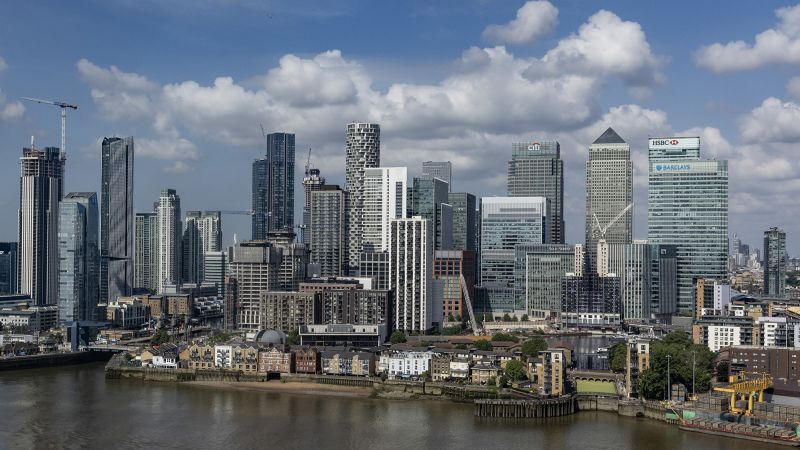London’s office market has plunged into a “rental recession,” with the share of empty space hitting its highest level in three decades, investment bank Jefferies said in a note Wednesday.
The New York-based firm said vacancies in the City of London, the UK capital’s historic financial district, accounted for 10% of the area’s total office space, while in the West End in central London that number stood at 7%. Both shares are the highest for 30 years.
And in Canary Wharf, a newer financial district, vacant units now exceed 20%.
London offices were last this empty in 1993, Michael Prew, a property analyst at Jefferies, told CNN, when the UK economy was in recession and its real estate market had crashed.
Now, vast tranches of the capital’s once-bustling business districts are gathering dust because of the persistence of remote work more than three years after the pandemic. Jefferies estimates that utilization of the city’s offices has fallen 20% since the end of 2019 as remote and hybrid work has flourished.
According to the investment bank, office vacancies have now reached a “tipping point” beyond which rents typically start to fall, prompting it to downgrade the stock of four big-cap property developers Monday, including British Land and Derwent London.
“Retail was technology’s first casualty and we think offices are next,” analysts at Jefferies wrote. “Utilization has shrunk and landlords are losing pricing power as tenants offload surplus space.”
One tech company giving up space is Meta (META), which owns Facebook.
On Monday, British Land said Meta had agreed to pay £149 million ($181 million) to break its lease on a 310,000-square-foot office near London’s Regent’s Park. The tech firm will continue to rent another nearby building, the developer said in a press release.
The move is expected to reduce British Land’s earnings per share by around 0.6 pence (0.73 cents) for the six months to next March, the company said.
Meta’s downsizing comes three months after HSBC (HSBC) announced plans to move out of its global headquarters in Canary Wharf and take up a much smaller building closer to London’s city center.
Canary Wharf, in the former docklands of east London, is facing particular pressure on rents. More bankers are reportedly leaving the area as UBS (UBS) begins relocating staff working for Credit Suisse to its main London office in the City. Credit Suisse, which was bought by UBS in a rescue takeover this year, was one of the original Canary Wharf tenants.
Clifford Chance is also due to leave the estate by 2028 to return to a smaller location, also in the City.
Regulators have been watching the commercial real estate market closely for any sign that spiraling vacancy rates and falling rents could become the source of the next financial crisis. Banks that have provided loans to developers could be hit hard by falling property values, investors and regulators have warned over the past few months.
“Investment market liquidity is receding on rent uncertainty and squeezing developer profits,” analysts at Jefferies wrote.
The downturn in office rentals stands in stark contrast to London’s residential rental market where demand is high and supply chronically low.
In August, the average annual rise in the cost of a rental property exceeded 17%, a gain it also recorded in April. These were the biggest jumps since real estate agency Hamptons started collecting the data in 2014.
Read the full article here










